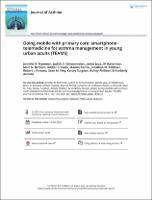Please use this identifier to cite or link to this item:
https://hdl.handle.net/20.500.12202/9826| Title: | Going mobile with primary care: Smartphone-telemedicine for asthma management in young urban adults (TEAMS). |
| Authors: | Feldman, Jonathan Mammen, Jennifer R. Schoonmaker, Judith D. Java, James Halterman, Jill Berliant, Marc N. Crowley, Amber. D Reznik, Marina Fortuna, Robert J. Frey, Sean M. Turgeon, Kelsey Philibert, Ashley Arcoleo, Kimberly 0000-0002-7326-3026 |
| Keywords: | Asthma self-management telemedicine clinical decicion support patient education clinical asthma management |
| Issue Date: | 2020 |
| Publisher: | United Kingdom : Taylor & Francis |
| Citation: | Mammen, J. R., Schoonmaker, J. D., Java, J., Halterman, J., Berliant, M. N., Crowley, A., Reznik, M., Feldman, J. M., Fortuna, R. J., Frey, S. M., Turgeon, K., Philibert, A., & Arcoleo, K. (2022). Going mobile with primary care: Smartphone-telemedicine for asthma management in young urban adults (TEAMS). Journal of Asthma, 59(1), 132–144. |
| Series/Report no.: | Journal of Asthma;59(1) |
| Abstract: | ABSTRACT Background: The majority of adults with persistent asthma have chronically uncontrolled disease and interventions to improve outcomes are needed. We evaluated the efficacy, feasibility, and acceptability of a multi-component smartphone-telemedicine program (TEAMS) to deliver asthma care remotely, support provider adherence to asthma management guidelines, and improve patient outcomes. Methods: TEAMS utilized: (1) remote symptom monitoring, (2) nurse-led smartphone-telemedicine with self-management training for patients, and (3) Electronic medical recordbased clinical decision support software. Adults aged 18-44 (N¼33) and primary care providers (N¼4) were recruited from a safety-net practice in Upstate New York. Asthma control, quality of life, and FEV1 were measured at 0, 3 and 6months. Acceptability was assessed via survey and end-of-study interviews. Paired t-test and mixed effects modeling were used to evaluate the effect of the intervention on asthma outcomes. Results: At baseline, 80% of participants had uncontrolled asthma. By 6-months, 80% classified as well-controlled. Improvements in control and quality of life were large (d¼1.955, d¼1.579). FEV%pred increased 4.2% (d¼1.687) with the greatest gain in males, smokers, and lower educational status. Provider adherence to national guidelines increased from 43.3% to 86.7% (CI ¼ 22.11-64.55) and patient adherence to medication increased from 45.58% to 85.29% (CI ¼ 14.79-64.62). Acceptability was 95.7%; In follow up interviews, 29/30 patients and all providers indicated TEAMS worked better than usual care, supported effective selfmanagement, and reduced symptoms over time, which led to greater self-efficacy and motivation to manage asthma. Discussion: Based on these findings, we conclude that smartphone telemedicine could substantially improve clinical asthma management, adherence to guidelines, and patient outcomes. |
| Description: | Research article / Open access |
| URI: | https://ezproxy.yu.edu/login?url=https://search.ebscohost.com/login.aspx?direct=true&AuthType=ip,sso&db=psyh&AN=2022-30541-014&site=eds-live&scope=site https://hdl.handle.net/20.500.12202/9826 |
| ISSN: | 0277-0903 (Print) 1532-4303 (Electronic) |
| Appears in Collections: | Ferkauf Graduate School of Psychology: Faculty Publications |
Files in This Item:
| File | Description | Size | Format | |
|---|---|---|---|---|
| Feldman 2020 OA Going mobile with primary care.pdf | 1.12 MB | Adobe PDF |  View/Open |
This item is licensed under a Creative Commons License

